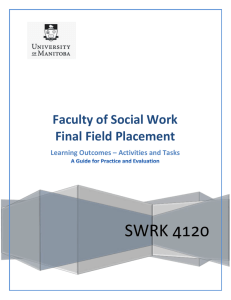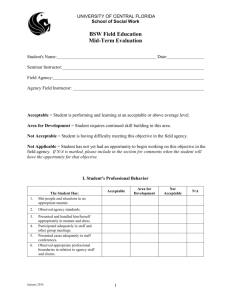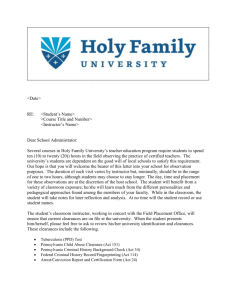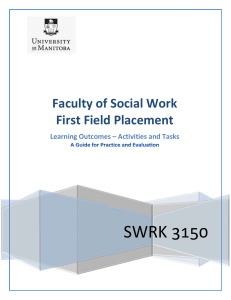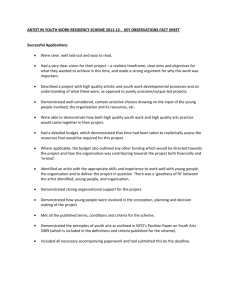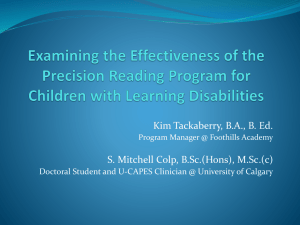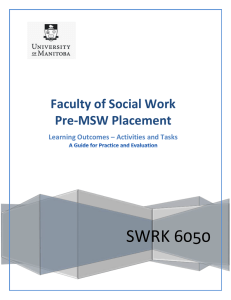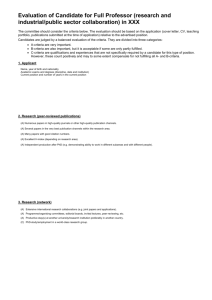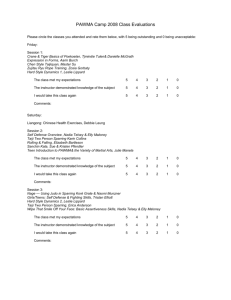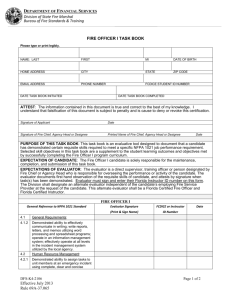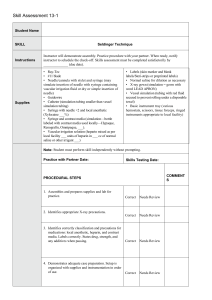FACULTY OF SOCIAL WORK - University of Manitoba
advertisement
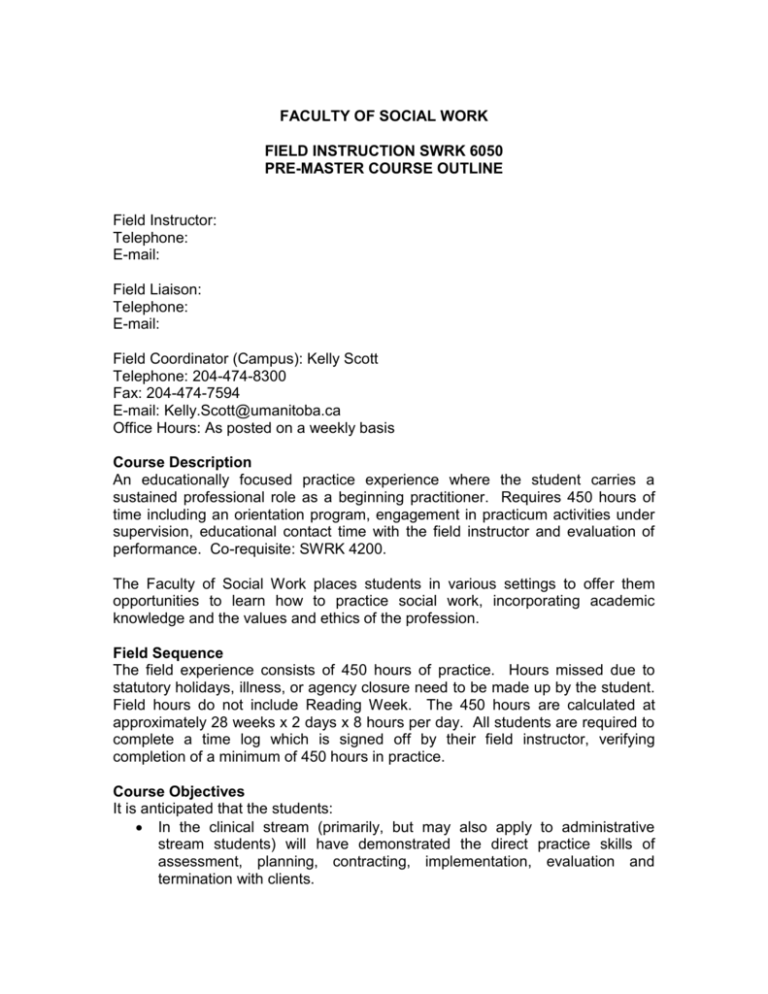
FACULTY OF SOCIAL WORK FIELD INSTRUCTION SWRK 6050 PRE-MASTER COURSE OUTLINE Field Instructor: Telephone: E-mail: Field Liaison: Telephone: E-mail: Field Coordinator (Campus): Kelly Scott Telephone: 204-474-8300 Fax: 204-474-7594 E-mail: Kelly.Scott@umanitoba.ca Office Hours: As posted on a weekly basis Course Description An educationally focused practice experience where the student carries a sustained professional role as a beginning practitioner. Requires 450 hours of time including an orientation program, engagement in practicum activities under supervision, educational contact time with the field instructor and evaluation of performance. Co-requisite: SWRK 4200. The Faculty of Social Work places students in various settings to offer them opportunities to learn how to practice social work, incorporating academic knowledge and the values and ethics of the profession. Field Sequence The field experience consists of 450 hours of practice. Hours missed due to statutory holidays, illness, or agency closure need to be made up by the student. Field hours do not include Reading Week. The 450 hours are calculated at approximately 28 weeks x 2 days x 8 hours per day. All students are required to complete a time log which is signed off by their field instructor, verifying completion of a minimum of 450 hours in practice. Course Objectives It is anticipated that the students: In the clinical stream (primarily, but may also apply to administrative stream students) will have demonstrated the direct practice skills of assessment, planning, contracting, implementation, evaluation and termination with clients. 2 In the administration stream (primarily, but may also apply to clinical stream students) will apply a range of organizational theories and strategies in social service administration and a range of models of planning and evaluating social policies and programs. It is anticipated that all students: Will have demonstrated evidence-based practice through integration of theory and research in practice activities; Will apply the eco-systemic perspective to social work practice; Will have been able to intervene in complex situations at the appropriate system level (micro, meso, macro) based on assessment skills; Will have integrated and demonstrated anti-oppressive practice principles; Will have demonstrated an understanding of the conflicting expectations in practice situations; Will have been able to establish and follow through on identified priorities as well as deal with unanticipated workload demands and/or crises; Will have initiated and sustained supportive and responsive relationships with clients and colleagues and facilitated effective communication over the necessary period of contact; Will have developed effective working relationships with the agency and University personnel; Will have been prepared for supervisory conferences, will remain open to new ideas and will demonstrate an ability to handle differences of opinion. Their written communication will contain essential information; Will have taken the initiative in developing and using relevant information to take responsibility for their ongoing professional development; Will have been able to consistently demonstrate an awareness of their own emotional responses and deal with these feelings in a professional manner Will have demonstrated ethical professional behaviour towards clients and colleagues in the practice setting; Will demonstrate an understanding of the implications of structural and policy factors on individuals, families, neighbourhoods, and communities. Will have demonstrated skill in identifying necessary policy change to improve intervention or the well-being of clients, and in organizing necessary action; and Will have demonstrated skill in identifying neighbourhood and community factors that affect the well-being of clients, and in identifying appropriate community development or community organization activity. Meetings and Workshops All students are expected to participate in meetings and workshops that are organized as part of the Field Program. Information and planning meetings held prior to the actual placement date are not counted as part of the 450 hours of placement. Workshops related to the Field Program that the student attends 3 during the academic year in which their placement occurs may be counted as part of the required field placement hours. Course Expectations The schedule of time required for the field placement will be included in the Learning Contract. Any variation to the time element must be negotiated and approved by the field instructor. Grading All field instructors with students must complete the Field Evaluation Form. This is the tool used to assign grades. The evaluation of a student is done on a pass/fail basis. Grade appeals should be discussed with the field instructor, then the Faculty Liaison, and finally the Field Coordinator. Outstanding issues may be appealed to the Appeals Committee of the Faculty of Social Work.
